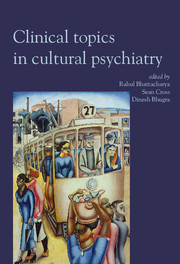Book contents
- Frontmatter
- Dedication
- Contents
- List of tables
- List of boxes
- List of figures
- List of contributors
- Preface
- Part 1 Theoretical and general issues
- 1 Globalisation, psychiatry and human rights: new challenges for the 21st century
- 2 Migration and mental illness
- 3 Mental health of refugees and asylum seekers
- 4 Racism, racial life events and mental ill health
- 5 Expressed emotion across cultures
- 6 Mental illness in Black and Asian ethnic minorities: care pathways and outcomes
- 7 Poverty, social inequality and mental health
- Part 2 Specific mental health conditions across cultures
- Part 3 Management issues in the cultural context
- Index
3 - Mental health of refugees and asylum seekers
from Part 1 - Theoretical and general issues
Published online by Cambridge University Press: 02 January 2018
- Frontmatter
- Dedication
- Contents
- List of tables
- List of boxes
- List of figures
- List of contributors
- Preface
- Part 1 Theoretical and general issues
- 1 Globalisation, psychiatry and human rights: new challenges for the 21st century
- 2 Migration and mental illness
- 3 Mental health of refugees and asylum seekers
- 4 Racism, racial life events and mental ill health
- 5 Expressed emotion across cultures
- 6 Mental illness in Black and Asian ethnic minorities: care pathways and outcomes
- 7 Poverty, social inequality and mental health
- Part 2 Specific mental health conditions across cultures
- Part 3 Management issues in the cultural context
- Index
Summary
Summary This chapter reviews contextual factors relating to people seeking asylum in host countries and becoming internally displaced within their country of origin. These are major life events for individuals, their families and communities and are likely to involve substantial changes and losses at a number of levels. Related terminology is defined and some of the more common exile-related stressors are considered, as is the resourcefulness of many refugees who overcome substantial obstacles and build productive lives in their new environments. Some of the issues that may require particular attention by psychiatrists when working with refugees and asylum seekers are examined. Finally, some implications for practice are reviewed, with consideration of issues relating to working across languages and cultures and to cultural constructions of mental health.
Refugees are not a recent phenomenon. Since the time of the Roman Empire people have fled their homes and sought refuge and protection in other countries. Refugees flee war, internal unrest and persecution because of their ethnic origin or their political, religious or social activities. Estimates of the number of refugees worldwide stand at 15.2 million; there are 827 000 asylum-seekers (pending cases) and 26 million internally displaced people (United Nations High Commission on Refugees, 2009). This number is larger than the entire population of Australia and it is perhaps pertinent to the debate to realise that it is almost the same as the number of refugees resulting from the Second World War. Refugees represent a variety of cultures, races and nations from all over the world. Summerfield (2000) reported that nearly 1% of the world's population were refugees or displaced persons as a result of about 40 violent conflicts.
The terms ‘asylum seeker’ and ‘refugee’ (see Box 3.1 for definitions) are frequently used in a negative and derogatory way, often associated with words such as bogus and scrounger. This type of language obscures the reality of who can be called refugees and why they seek sanctuary abroad. The status of those fleeing persecution is enshrined in international law, the United Nations Convention on Refugees, which resulted from a need to deal with the massive movements of people displaced by or fleeing the Second World War. Countries that have signed the Convention are obliged to consider the application of anyone who claims refugee status and grant that person refuge on the basis of the evidence.
- Type
- Chapter
- Information
- Clinical Topics in Cultural Psychiatry , pp. 27 - 38Publisher: Royal College of PsychiatristsPrint publication year: 2010



